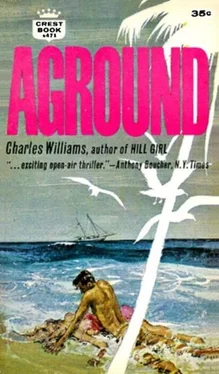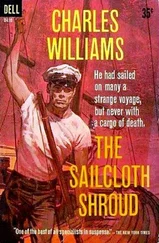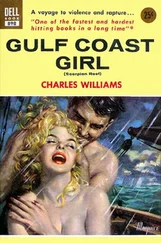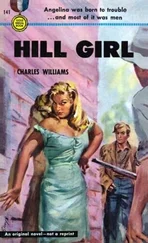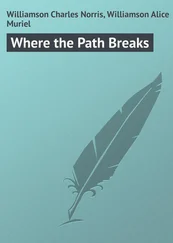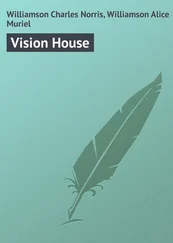The distant speck grew and divided into its separate components of sand bar and boat. Avery began his descent. Ingram spoke alongside his ear. “Let’s take another look at her before we go in. Get an idea of the tide.”
Avery nodded. The schooner was off to starboard and a thousand feet below as they went past. Ingram stared down at her. The empty deck still listed slightly to port in the early morning light, and there was about her something of the tragic helplessness of a beached and dying whale as she lay exactly as she had yesterday afternoon, on the same northerly heading. Avery swung in a wide circle and they came down past her only a few hundred feet above the water. Apparently nothing had changed at all except that the list might be slightly less, indicating the tide was higher. He studied the water moving ever so slowly past the imprisoned hull.
“Still flooding a little,” he said above the roar of the engines. “But probably pretty close to slack high water right now. You won’t drift much.”
Avery nodded. “You want to go by again?” “No. Let’s put her down.” “Righto. Cinch up your belts.”
Ingram went back and strapped himself in. He watched out the window as Avery swung west, toward the edge of the bank, made a preliminary run to study the water for possible obstructions, turned, and came in for the landing. Water, smooth as oil, came up toward them, and then they touched and the plane was drowned in a seething white curtain of spray. They slowed, and began to settle in the water. He unfastened his belt and went forward. They were about two miles west of the sand spit and the schooner. Avery turned. They began to taxi up toward her.
“We’d best not try to get too close,” he said. “I don’t trust those shoals around there.”
“Within a half mile will do,” Ingram replied. “And as long as the tide keeps flooding, you’d better go back to westward to wait for us.”
“How long do you think you’ll be aboard?”
“I can probably bring Mrs. Osborne back in a half hour or less. But suppose I call you on the radiotelephone, if it’s still working? Have you got either of the intership channels?”
Avery nodded. “Call on 2638.”
“Right,” Ingram said. He stepped into the after compartment, attached the inflating bottle to the valve of the raft, and put enough air into it to keep it afloat. Avery came aft. He opened the door and they pushed the raft out. Ingram knelt in the opening and completed the inflation. Mrs. Osborne was standing behind them now. The plane rocked gently with little gurgling sounds under its hull as they swung around on the tide. Avery held the raft while Ingram helped her in. She settled herself aft. Ingram put his suitcase in, along with the air bottle and the light aluminum oars, and stepped down himself and pushed away from the plane.
He slid the handles of the oars through the tabs that served as oarlocks and began rowing. As soon as they were out from behind the plane, he looked over his shoulder and saw that Avery had approached nearer than he had expected; the Dragoon was not more than four hundred yards away. The sun was just coming up out of the sea beyond her, throwing her into silhouette. Beautiful, he thought—if she weren’t so obviously aground. Boats in trouble always left you with an uncomfortable feeling.
It was still dead calm, and the water lay as flat as steel except for an occasional and almost imperceptible lift and fall from some vestigial remnant of surge running in from the Santaren Channel, attenuated by five miles of shoal water between here and the edge of the Bank. He dug in the oars. As soon as they were clear of the plane, Avery started the starboard engine, swung, and taxied toward the deeper water to the west. Ingram studied the water around and under them as he rowed. Judging from the color and from what he could see of the bottom straight down, it was sand and at least two fathoms deep all the way up to where the Dragoon was lying, and the channel was a good hundred yards wide. The schooner drew seven feet; if they could get her off into it, she could probably make it back to deep water without trouble, provided they made the attempt in good light.
But—he shot another glance over his shoulder—getting her off didn’t look too promising as they came nearer. The blue water of the channel was half a ship’s length away from her stern. The deepest part of her keel would be still another thirty feet forward of that, so she might have to move back some sixty or seventy feet before she found enough water to float her unless the tide came a lot higher than it was now, and he was afraid it was very near to slack high at the moment.
The sound of the plane’s engine died abruptly as Avery cut it off and let the plane come to rest about a mile away. They were now less than fifty yards from the port side of the schooner. He changed course to come around under her stern.
“Can’t we go aboard on this side?” Mrs. Osborne asked.
“There’s something I want to see first,” he replied.
“Oh,” she said. “The name.”
Not exactly, he thought, but made no reply. She was leaning to the right, trying to get a glimpse of it. “Lorna,” she called out suddenly. “And look—you can still see a little of the old lettering under that blue paint.”
He glanced around as they came in under the counter. She was right. The new name had been lettered in black over the light blue with which they’d painted the topsides, but at either end the D and the n of Dragoon still showed. It was a sloppy job of painting. He shipped the oars and caught hold of the rudder post; they stopped, and hung, suspended in utter silence. The tide was almost at a standstill. He waited for the ripples to die away, and then leaned over, peering straight down through water as transparent as gin. His eyes narrowed.
“What is it?” she asked.
“Look,” he replied. “See that long gouge the keel made, leading backward toward the channel?”
“Yes. What does that mean?”
“She didn’t drift in here. She was under way when she hit.”
She looked up. “Then they were still aboard.”
“Somebody was.”
He noted that unconsciously they had lowered their voices. Well, there was something ghostly about it. Maybe it was the silence.
Why hadn’t they at least tried to kedge her off? From the looks of the bottom they’d backed the engine down, throwing sand forward, but there was no sign of an anchor cable, even a broken one. It was possible, of course, that the dinghy was already gone, but they could have floated the anchor astern, using one of the booms for a raft, or carried it across the bottom a few steps at a time by diving. He’d better keep Mrs. Osborne on deck until he’d had a look below; there could be a body, or bodies.
He shoved away from the rudder post and took up the oars again. They went slowly up the starboard side. She was low in the water, all right. Several inches. This was the high side, the way she was listing, and the line of the old boot-topping was almost in the water. If you had her up to her proper water line, she’d be within a foot of floating right now. She must be holed. He peered down but couldn’t see past the turn of the bilge. They continued forward, passed under the bowsprit, and came aft along the port side.
When they came abreast of the main he shipped the oars again and reached up to catch the shrouds just above the chainplates. With the port list, the deck was not too high above them. Gathering up the painter, he climbed on deck. He made the painter fast and reached down a hand for her. She scrambled up, ducked under the lifeline, and stood beside him.
The deckhouses were long and low, rising not over two feet above the deck, with small portholes along their sides. Two or three of the portholes were open, but he could see nothing beyond them because of the dimness inside the cabins. The sun was above the horizon now and warm on the side of his face as it gilded the masts and rigging. Everything was wet with dew. He stood for a moment looking along the sloping, deserted deck. There was an air of desolation about it as though the schooner had been abandoned for weeks, but he realized it was probably nothing more than a general untidiness that offended his seaman’s sense of order. The sails were gathered in sloppy and dribbling bundles along the booms rather than properly furled, and at the bases of the fore- and mainmasts the falls of halyards and topping lifts lay helter-skelter in a confused jumble of rope. Neither of them had said a word. It was almost as though they were reluctant to break the hush.
Читать дальше
